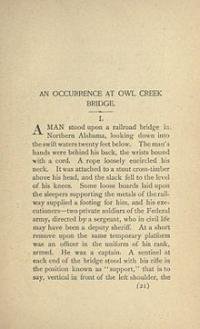Ambroz Birs - The Suitable Surroundings
Here you can read online Ambroz Birs - The Suitable Surroundings full text of the book (entire story) in english for free. Download pdf and epub, get meaning, cover and reviews about this ebook. year: 1889, genre: Prose. Description of the work, (preface) as well as reviews are available. Best literature library LitArk.com created for fans of good reading and offers a wide selection of genres:
Romance novel
Science fiction
Adventure
Detective
Science
History
Home and family
Prose
Art
Politics
Computer
Non-fiction
Religion
Business
Children
Humor
Choose a favorite category and find really read worthwhile books. Enjoy immersion in the world of imagination, feel the emotions of the characters or learn something new for yourself, make an fascinating discovery.

- Book:The Suitable Surroundings
- Author:
- Genre:
- Year:1889
- Rating:5 / 5
- Favourites:Add to favourites
- Your mark:
- 100
- 1
- 2
- 3
- 4
- 5
The Suitable Surroundings: summary, description and annotation
We offer to read an annotation, description, summary or preface (depends on what the author of the book "The Suitable Surroundings" wrote himself). If you haven't found the necessary information about the book — write in the comments, we will try to find it.
The Suitable Surroundings — read online for free the complete book (whole text) full work
Below is the text of the book, divided by pages. System saving the place of the last page read, allows you to conveniently read the book "The Suitable Surroundings" online for free, without having to search again every time where you left off. Put a bookmark, and you can go to the page where you finished reading at any time.
Font size:
Interval:
Bookmark:
The Suitable Surroundings
by Ambrose Bierce
THE NIGHT
One midsummer night a farmer's boy living about ten miles from the city of Cincinnati was following a bridle path through a dense and dark forest. He had lost himself while searching for some missing cows, and near midnight was a long way from home, in a part of the country with which he was unfamiliar. But he was a stout-hearted lad, and knowing his general direction from his home, he plunged into the forest without hesitation, guided by the stars. Coming into the bridle path, and observing that it ran in the right direction, he followed it.
The night was clear, but in the woods it was exceedingly dark. It was more by the sense of touch than by that of sight that the lad kept the path. He could not, indeed, very easily go astray; the undergrowth on both sides was so thick as to be almost impenetrable. He had gone into the forest a mile or more when he was surprised to see a feeble gleam of light shining through the foliage skirting the path on his left. The sight of it startled him and set his heart beating audibly.
"The old Breede house is somewhere about here," he said to himself. "This must be the other end of the path which we reach it by from our side. Ugh! what should a light be doing there?"
Nevertheless, he pushed on. A moment later he had emerged from the forest into a small, open space, mostly upgrown to brambles. There were remnants of a rotting fence. A few yards from the trail, in the middle of the "clearing," was the house from which the light came, through an unglazed window. The window had once contained glass, but that and its supporting frame had long ago yielded to missiles flung by hands of venturesome boys to attest alike their courage and their hostility to the supernatural; for the Breede house bore the evil reputation of being haunted. Possibly it was not, but even the hardiest sceptic could not deny that it was desertedwhich in rural regions is much the same thing.
Looking at the mysterious dim light shining from the ruined window the boy remembered with apprehension that his own hand had assisted at the destruction. His penitence was of course poignant in proportion to its tardiness and inefficacy. He half expected to be set upon by all the unworldly and bodiless malevolences whom he had outraged by assisting to break alike their windows and their peace. Yet this stubborn lad, shaking in every limb, would not retreat. The blood in his veins was strong and rich with the iron of the frontiersman. He was but two removes from the generation that had subdued the Indian. He started to pass the house.
As he was going by he looked in at the blank window space and saw a strange and terrifying sight,the figure of a man seated in the centre of the room, at a table upon which lay some loose sheets of paper. The elbows rested on the table, the hands supporting the head, which was uncovered. On each side the fingers were pushed into the hair. The face showed dead-yellow in the light of a single candle a little to one side. The flame illuminated that side of the face, the other was in deep shadow. The man's eyes were fixed upon the blank window space with a stare in which an older and cooler observer might have discerned something of apprehension, but which seemed to the lad altogether soulless. He believed the man to be dead.
The situation was horrible, but not with out its fascination. The boy stopped to note it all. He was weak, faint and trembling; he could feel the blood forsaking his face. Nevertheless, he set his teeth and resolutely advanced to the house. He had no conscious intentionit was the mere courage of terror. He thrust his white face forward into the illuminated opening. At that instant a strange, harsh cry, a shriek, broke upon the silence of the nightthe note of a screech-owl. The man sprang to his feet, overturning the table and extinguishing the candle. The boy took to his heels.
THE DAY BEFORE
"Good-morning, Colston. I am in luck, it seems. You have often said that my commendation of your literary work was mere civility, and here you find me absorbedactually mergedin your latest story in the Messenger. Nothing less shocking than your touch upon my shoulder would have roused me to consciousness."
"The proof is stronger than you seem to know," replied the man addressed: "so keen is your eagerness to read my story that you are willing to renounce selfish considerations and forego all the pleasure that you could get from it."
"I don't understand you," said the other, folding the newspaper that he held and putting it into his pocket. "You writers are a queer lot, anyhow. Come, tell me what I have done or omitted in this matter. In what way does the pleasure that I get, or might get, from your work depend on me?"
"In many ways. Let me ask you how you would enjoy your breakfast if you took it in this street car. Suppose the phonograph so perfected as to be able to give you an entire opera,singing, orchestration, and all; do you think you would get much pleasure out of it if you turned it on at your office during business hours? Do you really care for a serenade by Schubert when you hear it fiddled by an untimely Italian on a morning ferryboat? Are you always cocked and primed for enjoyment? Do you keep every mood on tap, ready to any demand? Let me remind you, sir, that the story which you have done me the honor to begin as a means of becoming oblivious to the discomfort of this car is a ghost story!"
"Well?"
"Well! Has the reader no duties corresponding to his privileges? You have paid five cents for that newspaper. It is yours. You have the right to read it when and where you will. Much of what is in it is neither helped nor harmed by time and place and mood; some of it actually requires to be read at oncewhile it is fizzing. But my story is not of that character. It is not 'the very latest advices' from Ghostland. You are not expected to keep yourself au courant with what is going on in the realm of spooks. The stuff will keep until you have leisure to put yourself into the frame of mind appropriate to the sentiment of the piecewhich I respectfully submit that you cannot do in a street car, even if you are the only passenger. The solitude is not of the right sort. An author has rights which the reader is bound to respect."
"For specific example?"
"The right to the reader's undivided attention. To deny him this is immoral. To make him share your attention with the rattle of a street car, the moving panorama of the crowds on the sidewalks, and the buildings beyondwith any of the thousands of distractions which make our customary environmentis to treat him with gross injustice. By God, it is infamous!"
The speaker had risen to his feet and was steadying himself by one of the straps hanging from the roof of the car. The other man looked up at him in sudden astonishment, wondering how so trivial a grievance could seem to justify so strong language. He saw that his friend's face was uncommonly pale and that his eyes glowed like living coals.
"You know what I mean," continued the writer, impetuously crowding his words"you know what I mean, Marsh. My stuff in this morning's Messenger is plainly sub-headed 'A Ghost Story.' That is ample notice to all. Every honorable reader will understand it as prescribing by implication the conditions under which the work is to be read."
The man addressed as Marsh winced a trifle, then asked with a smile: "What conditions? You know that I am only a plain business man who cannot be supposed to understand such things. How, when, where should I read your ghost story?"
"In solitudeat nightby the light of a candle. There are certain emotions which a writer can easily enough excitesuch as compassion or merriment. I can move you to tears or laughter under almost any circumstances. But for my ghost story to be effective you must be made to feel fearat least a strong sense of the supernaturaland that is a difficult matter. I have a right to expect that if you read me at all you will give me a chance; that you will make yourself accessible to the emotion that I try to inspire."
Font size:
Interval:
Bookmark:
Similar books «The Suitable Surroundings»
Look at similar books to The Suitable Surroundings. We have selected literature similar in name and meaning in the hope of providing readers with more options to find new, interesting, not yet read works.
Discussion, reviews of the book The Suitable Surroundings and just readers' own opinions. Leave your comments, write what you think about the work, its meaning or the main characters. Specify what exactly you liked and what you didn't like, and why you think so.


